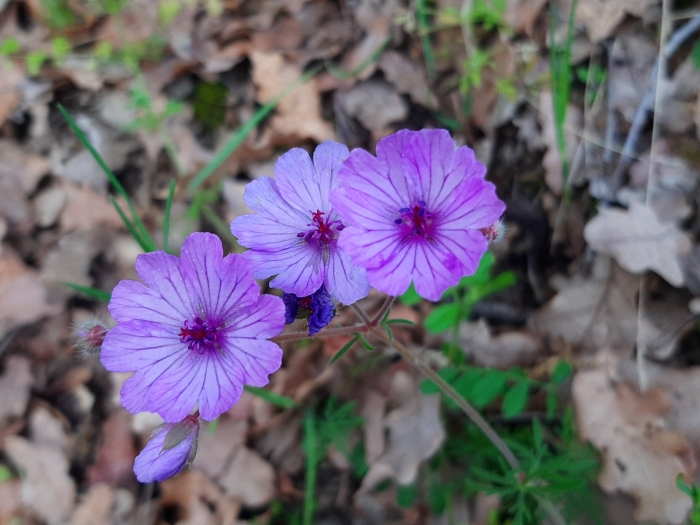Tuberous-Rooted Cranesbill
(Geranium tuberosum)
Tuberous-Rooted Cranesbill (Geranium tuberosum)
/
/

© Serdar Ölez
CC BY-SA 4.0
Image By:
© Serdar Ölez
Recorded By:
Copyright:
CC BY-SA 4.0
Copyright Notice:
Photo by: © Serdar Ölez | License Type: CC BY-SA 4.0 | License URL: http://creativecommons.org/licenses/by-sa/4.0/ | Uploader: gezenadam | Publisher: iNaturalist |























Estimated Native Range
Summary
Geranium tuberosum, commonly known as tuberous-rooted cranesbill, is a perennial herb native to a variety of habitats including open woodlands, grasslands, and rocky slopes in the Mediterranean region, the Caucasus, and western Asia. It typically grows to a height of 12-18 inches (30-45 cm) with a similar spread. The plant features deeply lobed leaves and bears showy, mauve to purple flowers with darker veining in late spring to early summer. The flowers are quite attractive and are known to draw in pollinators such as bees and butterflies.
Tuberous-rooted cranesbill is valued for its ornamental flowers and its ability to naturalize in suitable conditions. It is often used in borders, rock gardens, and as underplanting for taller perennials or shrubs. This species thrives in full sun to part shade and prefers well-drained soil, although it can tolerate a range of soil types. It is relatively low maintenance, requiring only occasional watering once established. ’Rosie’s Mauve’ and ’Richard Hobbs’ are popular cultivars, with the former known for its deep mauve flowers and the latter for its larger, violet-blue blooms. Potential problems include slugs and snails, which may damage the foliage. It is not known to be invasive and does not have aggressive roots, making it a safe choice for a variety of garden settings.CC BY-SA 4.0
Tuberous-rooted cranesbill is valued for its ornamental flowers and its ability to naturalize in suitable conditions. It is often used in borders, rock gardens, and as underplanting for taller perennials or shrubs. This species thrives in full sun to part shade and prefers well-drained soil, although it can tolerate a range of soil types. It is relatively low maintenance, requiring only occasional watering once established. ’Rosie’s Mauve’ and ’Richard Hobbs’ are popular cultivars, with the former known for its deep mauve flowers and the latter for its larger, violet-blue blooms. Potential problems include slugs and snails, which may damage the foliage. It is not known to be invasive and does not have aggressive roots, making it a safe choice for a variety of garden settings.CC BY-SA 4.0
Plant Description
- Plant Type: Bulb
- Height: 1-1.5 feet
- Width: 0.5-1 feet
- Growth Rate: Moderate
- Flower Color: Purple
- Flowering Season: Spring
- Leaf Retention: Deciduous
Growth Requirements
- Sun: Full Sun, Part Shade
- Water: Medium
- Drainage: Medium
Common Uses
Bee Garden, Border Plant, Butterfly Garden, Groundcover, Low Maintenance
Natural Habitat
Native to open woodlands, grasslands, and rocky slopes in the Mediterranean region, the Caucasus, and western Asia
Other Names
Common Names: Roundleaf Geranium, Bulbous Geranium
Scientific Names: , Geranium tuberosum, Geranium geminatum, Geranium geminatum, Geranium radicatum, Geranium stepporum, Geranium tuberosum f. angustilobum, Geranium tuberosum subsp. deserti-syriacum, Geranium tuberosum subsp. eu-tuberosum, Geranium tuberosum subsp. inciso-dentatum
GBIF Accepted Name: